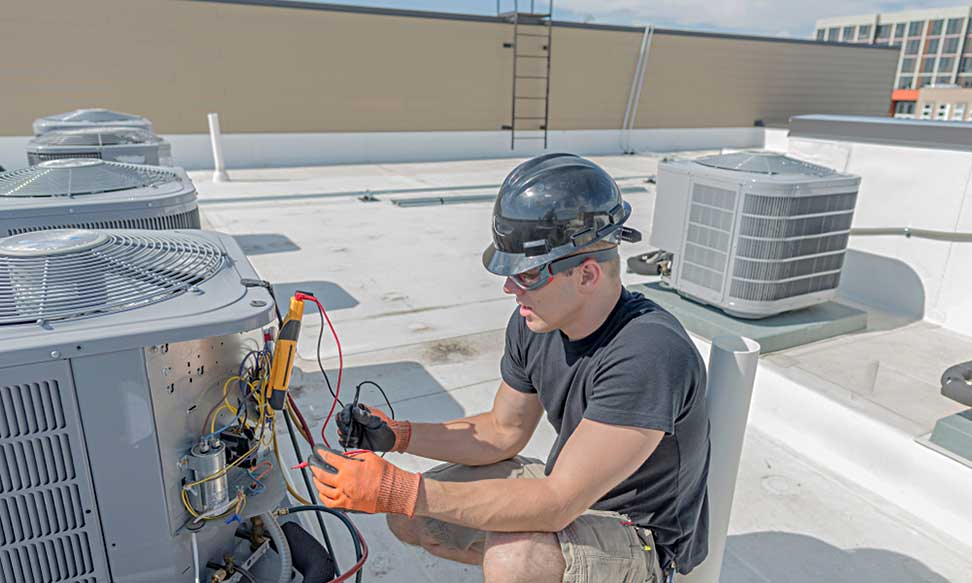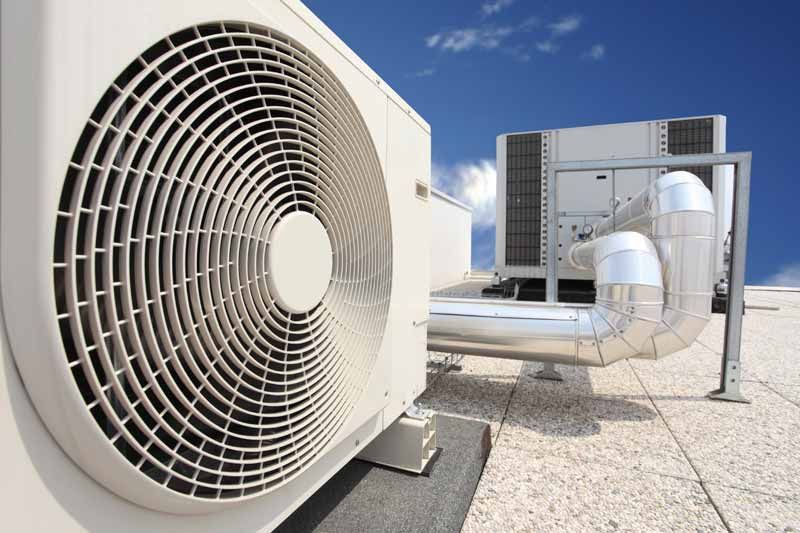Signs of a Quality heat pump installation ooltewah tn
Signs of a Quality heat pump installation ooltewah tn
Blog Article
Selecting In Between a Heat Pump and Heating System: Key Factors To Consider for Your A/c Demands
When examining heating alternatives for HVAC needs, the choice between a heatpump and a heater can be complicated. Each system provides distinct benefits customized to particular environments and energy efficiency objectives. Comprehending these differences is important for making an informed option. Trick aspects such as installation prices and environmental impact additionally complicate the option process. Which alternative genuinely aligns with one's convenience and sustainability preferences? The adhering to sections will certainly check out these considerations thoroughly.
Understanding Warm Pumps: How They Function and Their Advantages
While many homeowners take into consideration numerous heating alternatives, recognizing just how heatpump feature and their advantages can substantially influence their choice. Heat pumps operate by transferring warmth instead of creating it. In the winter season, they remove warmth from the outside air or ground and transfer it inside, while in the summer, they reverse this procedure, cooling down the home by removing warmth outside. This dual performance makes them functional for year-round environment control.One of the main advantages of heatpump is their energy effectiveness. They make use of considerably much less power contrasted to traditional home heating systems, possibly resulting in lower utility expenses (ductless mini splits). Furthermore, warm pumps have a smaller sized carbon impact, making them an eco-friendly choice. They likewise need much less maintenance than traditional systems, adding to long-term expense financial savings. On the whole, recognizing the auto mechanics and benefits of warm pumps can assist home owners make educated choices concerning their home heating and cooling down demands
Exploring Furnaces: Kinds, Operation, and Advantages
Heaters come in various kinds, consisting of gas, electric, and oil models, each with distinct operational devices. Recognizing these distinctions is essential, as they influence performance and heating efficiency. Additionally, furnaces supply countless advantages, such as consistent heat result and dependability in colder environments.
Sorts of Heating systems
Heating systems can differ significantly in design and procedure, with heaters being a prominent option amongst house owners. There are numerous types of heating systems, each utilizing different fuel resources and modern technologies. Gas furnaces are common, leveraging gas to create warm successfully. Electric heaters, on the other hand, make use of electric resistance to create warmth, typically preferred for their simple installation. Oil heaters, while less typical, work in locations with restricted gas accessibility (heat pump replacement ooltewah tn). Furthermore, condensing heating systems maximize power efficiency by reusing and catching exhaust gases. Each kind operates with a system of warmth exchangers and ductwork to distribute cozy air throughout a home. Understanding the distinctions in between these heater types is crucial for informed a/c choices
Benefits of Furnaces
For house owners seeking trusted heat during chilly months, the benefits of furnaces are considerable. Heaters give consistent home heating, making sure even temperatures throughout the home. They are especially reliable in severe chilly, often outshining heat pumps in freezing conditions. Different types, consisting of gas, electrical, and oil heaters, offer flexibility to meet diverse needs and preferences.Furnaces likewise tend to have lower initial installation costs compared to heat pumps, making them a more available choice for lots of. Their robust style contributes to a longer lifespan, with many units lasting over 15 years with appropriate maintenance. Additionally, modern furnaces are often outfitted with sophisticated technology for boosted efficiency, which can lead to minimized energy expenses. Overall, heating systems stay a reliable choice for effective home heating.

Energy Effectiveness: Contrasting Warmth Pumps and Furnaces
When comparing energy performance in between warm pumps and furnaces, the Seasonal Power Performance Ratio (SEER) plays an important role in determining efficiency. In addition, a functional cost analysis exposes the long-lasting monetary ramifications of each system. Comprehending these factors can guide homeowners in making notified choices concerning their home heating remedies.
Seasonal Power Performance Ratio
Power performance plays a necessary role in the decision-making process in between warm pumps and heating systems, specifically when taking into consideration the Seasonal Energy Efficiency Ratio (SEER) This metric actions the cooling efficiency of warmth pumps over a whole air conditioning period, giving a standard way to assess performance. Greater SEER ratings indicate better power efficiency, equating to lower power usage and reduced energy costs. In comparison, heaters are generally analyzed using the Annual Fuel Application Performance (AFUE) rating, which reflects heating effectiveness. When comparing these two systems, house owners ought to focus on SEER scores for heat pumps, as they directly effect total power financial savings and ecological sustainability. A thorough understanding of SEER can especially affect the lasting contentment and cost-effectiveness of find out here now the selected HVAC remedy.
Functional Cost Analysis
Recognizing the operational expenses connected with warm pumps and heating systems is important for house owners evaluating their options. Warm pumps usually supply greater energy performance, transforming electrical power right into warm with minimal waste. This results in lower monthly utility costs, especially in modest environments. Alternatively, traditional heaters, specifically gas designs, might have lower upfront prices but can incur higher functional expenses gradually due to sustain rates and efficiency ratings.Moreover, heatpump can function as both heating and cooling down systems, possibly reducing the requirement for different heating and cooling devices. While initial investments for warmth pumps might be higher, their long-lasting cost savings in power performance can make them a more economical choice for numerous families. Careful analysis of regional energy rates is necessary to identify the finest alternative.
Installment Prices: What to Expect for Each Heating System
Installation prices for home heating systems can vary significantly between heat pumps and heaters, affecting property owners' choices. Heatpump usually have greater in advance installation costs, normally varying from $3,500 to $8,000, depending upon the device dimension and complexity of installation. This consists of the outdoor system, indoor handling system, and required ductwork modifications. Conversely, heating systems have a tendency to have lower initial costs, balancing in between $2,500 and $6,000, which can be appealing for budget-conscious house owners. Nonetheless, setup expenses can boost if considerable ductwork is required.Moreover, the selection of gas type for furnaces-- all-natural gas, lp, or electric-- can additionally influence setup costs. While warm pumps use power efficiency, their first investment may hinder some purchasers. Eventually, assessing installation costs along with long-lasting savings and efficiency will certainly aid homeowners in making informed choices regarding their furnace.
Climate Factors To Consider: Which System Carries Out Better in Your Area
How do environment problems influence the performance of furnace? The efficiency of heat pumps and heaters can differ significantly relying on the local environment. In modest climates, warm pumps excel by effectively moving heat from the outside air, making them an energy-saving alternative. However, their effectiveness lessens in incredibly cool temperature levels, where they may have a hard time look these up to remove adequate heat. Conversely, heaters, specifically gas versions, offer trustworthy and regular warm no matter exterior conditions, making them more suitable in chillier regions.In areas that experience milder wintertimes, heatpump can operate properly year-round, providing both cooling and heating. In comparison, regions with harsh winter seasons usually gain from the effectiveness of heaters. Ultimately, recognizing the neighborhood climate is important when deciding in between a heat pump and a heating system, as it directly impacts their functional efficiency and total performance.
Maintenance Demands: Long-Term Treatment for Warmth Pumps vs. Furnaces
While both heatpump and furnaces require routine maintenance to guarantee peak efficiency, their particular needs and treatment routines vary substantially. Heating systems usually need much less regular attention, with yearly assessments being adequate to look for gas leakages, tidy filters, and examine general performance. Their easier layout commonly allows for straightforward repairs.In contrast, heatpump demand biannual maintenance because of their dual function in cooling and heating. This consists of cleansing coils, inspecting cooling agent levels, and making sure that both the outdoor and indoor systems work at their best. In addition, heat pump upkeep commonly includes more intricate parts, making professional maintenance essential.Neglecting upkeep can cause diminished performance and raised power expenses for both systems. Ultimately, property owners should consider these long-term care demands when picking between a heatpump and a furnace, as proactive upkeep can expand the lifespan and performance of either system considerably.
Environmental Effect: Selecting a Sustainable Heating Alternative
The ecological influence of heater is an essential analysis for property owners looking for lasting alternatives. Warm pumps are normally more energy-efficient than conventional heating systems, as they transfer warmth instead of produce it, greatly reducing carbon discharges. By making use of renewable resource sources, such as air-source or geothermal warmth pumps, homeowners can further reduce their environmental footprint.On the various other hand, gas heaters produce greenhouse gases and add to air pollution, though they often offer higher warm result. Developments in modern technology have led to the development of high-efficiency furnaces that reduce emissions.Ultimately, choosing a home heating system includes evaluating effectiveness versus ecological impact. House owners are encouraged to review regional energy resources and incentives for eco-friendly systems, guaranteeing a selection that straightens with both personal comfort and ecological obligation. The decision impacts not only instant comfort but likewise long-lasting sustainability and ecological health.
Often Asked Inquiries
For How Long Do Warmth Pumps and Furnaces Generally Last?
The life expectancy of heatpump normally ranges from 15 to twenty years, while furnaces can last in between 15 to thirty years. Routine maintenance substantially affects their durability and performance in giving heating remedies.
Can I Use a Heatpump in Very Cold Climates?
Warmth pumps can operate in incredibly cold environments, but their efficiency decreases as temperature levels decline. In such problems, supplementary home heating sources might be required to maintain comfortable indoor temperatures and assure peak efficiency.

What Is the Noise Level of Warmth Pumps Versus Furnaces?
The sound levels of heatpump and heating systems differ substantially. Usually, heatpump run more silently than conventional furnaces, making them more effective for those conscious appear, while heating systems might create louder operational sounds throughout home heating cycles.
Are Warmth Pumps Suitable for Both Heating and Cooling?
Warmth pumps are undoubtedly suitable for both heating & cooling (ductless mini splits). They work by moving heat, offering reliable temperature level control year-round, making them a functional option for home owners looking for an all-in-one heating and cooling service
What Dimension Home Heating System Do I Need for My Home?
Figuring out the appropriate dimension heating unit for a home calls for reviewing factors such as square video footage, insulation quality, regional environment, and the home's layout. Consulting an expert can assure an exact evaluation and optimal convenience. Heat pumps commonly supply higher power performance, transforming electric energy right into heat with very little waste. In modest environments, warmth pumps stand out by effectively transferring warm from the outside air, making them an check this energy-saving option. Alternatively, furnaces, especially gas models, supply regular and reputable heat no matter of outdoor conditions, making them better in colder regions.In areas that experience milder wintertimes, warm pumps can run properly year-round, giving both home heating and cooling. Heat pumps are generally much more energy-efficient than standard heating systems, as they move heat rather than generate it, considerably lowering carbon emissions. By making use of eco-friendly energy sources, such as air-source or geothermal heat pumps, house owners can even more minimize their ecological footprint.On the other hand, natural gas heaters produce greenhouse gases and add to air contamination, though they usually give greater warm output.
Report this page